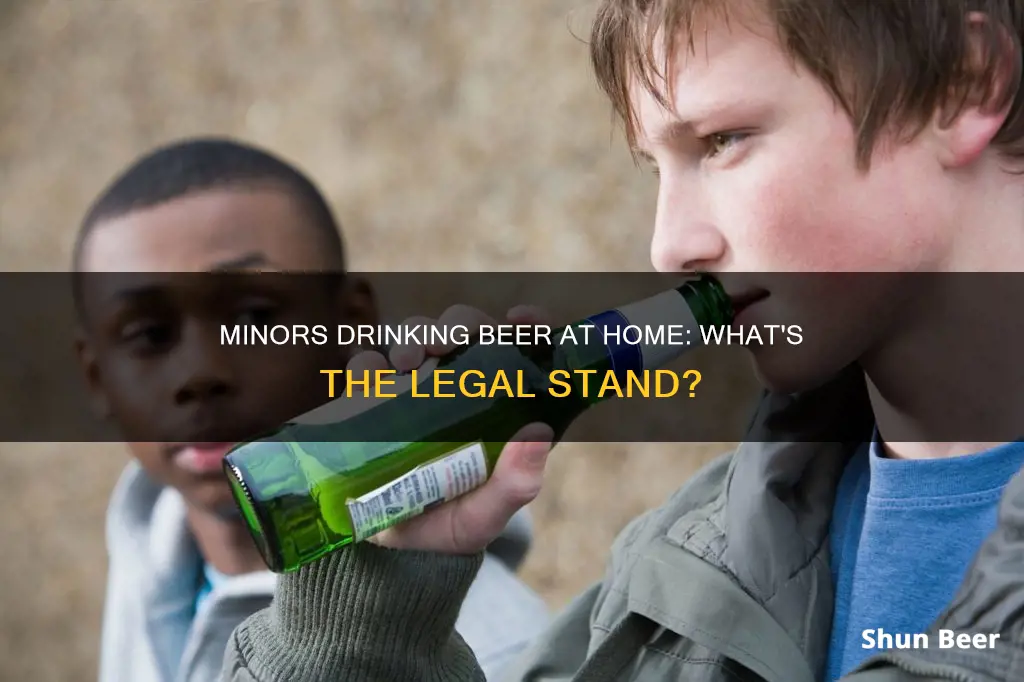
In the United States, the legal drinking age is 21. However, there are exceptions to this rule, as some states allow minors to consume alcohol with parental consent. For instance, in Colorado, Maryland, Montana, New York, Texas, Oregon, Washington, Wisconsin, and Wyoming, minors can legally drink alcohol with the consent of a parent or guardian in private. On the other hand, some states, like Alabama, Arkansas, Idaho, New Hampshire, and West Virginia, prohibit any consumption of alcohol by minors.
When it comes to non-alcoholic beverages, the laws become even more complex. Non-alcoholic beers are defined as those with less than 0.5% alcohol by volume (ABV). While federal law states that minors can consume beverages with less than 0.5% ABV, some states have their own regulations. For example, Mississippi, North Dakota, and Ohio only permit the consumption of non-alcoholic beer by those 18 and older, while 14 states prohibit minors from drinking it altogether.
The legality of minors drinking beer, whether alcoholic or non-alcoholic, varies depending on state and local laws. As such, it is essential to refer to the specific regulations in your state or county to understand what is permitted.
What You'll Learn
- Non-alcoholic beer may contain trace amounts of alcohol
- Minors drinking non-alcoholic beer at home may be illegal in some states
- Minors drinking alcoholic beer at home may be allowed in some states
- Minors drinking at home may be allowed if a parent or guardian is present
- Minors drinking at home may be allowed if they have parental consent

Non-alcoholic beer may contain trace amounts of alcohol
The laws surrounding minors drinking non-alcoholic beer are complex and vary from state to state in the US. While the federal government's National Minimum Drinking Age (NMDA) Act of 1984 prohibits the sale to and public possession of alcohol by anyone under the age of 21, it does not apply to beverages with an alcohol by volume (ABV) of less than one half of one per cent.
Non-alcoholic beer is legally allowed to contain up to 0.5% ABV, and so falls outside of the NMDA's definition of an alcoholic beverage. This means that, at a federal level, minors are allowed to drink non-alcoholic beer. However, individual states have differing rules. Mississippi, North Dakota, and Ohio only allow the drinking of non-alcoholic beer for those 18 and older, and 14 states prohibit minors from drinking it altogether.
Non-alcoholic beer is not always completely alcohol-free. In the US, brewers can label beer as "non-alcoholic" as long as it contains less than 0.5% ABV. While this is not enough alcohol to cause intoxication, it is still a trace amount. Many everyday foods and beverages contain trace amounts of alcohol as a natural product of fermentation. For example, fruit juices like orange juice, apple juice, and grape juice can contain an ABV of up to 0.86%, and a ripe banana can measure up to 0.4% ABV.
Despite the low ABV of non-alcoholic beer, it is generally not recommended for children and teens. While it may be legal for minors to drink in some states, most health agencies do not advise it. This is because non-alcoholic beer tastes like real beer and contains trace amounts of alcohol.
Beer and Milkshakes: Mixing Drinks, Safe or Not?
You may want to see also

Minors drinking non-alcoholic beer at home may be illegal in some states
The laws surrounding minors drinking non-alcoholic beer vary from state to state in the US. While the federal government-defined category of beer in the National Minimum Drinking Age (NMDA) Act of 1984 states that "alcoholic beverages" include beer, distilled spirits, and wine containing at least 0.5% alcohol by volume, individual states have different definitions of what constitutes an alcoholic beverage.
According to the NMDA, the sale and public possession of alcohol by anyone under the age of 21 is illegal. However, in certain states such as Colorado, Maryland, Montana, New York, Texas, Oregon, Washington, Wisconsin, and Wyoming, minors can legally consume alcohol with the consent of a parent or guardian aged 21 or older in private. In Ohio, Louisiana, Massachusetts, and Texas, minors can even consume alcohol in public with the consent and presence of a legal parent or guardian.
When it comes to non-alcoholic beer, the laws become more complex. Non-alcoholic beers are still regulated by the Federal Alcohol Administration Act, even though their alcohol content is below the threshold for what is considered an alcoholic beverage. This is due to a legal anomaly where any malt beverage is regulated by the FAA, which does not specify an ABV minimum.
As a result, the laws surrounding the purchase and consumption of non-alcoholic beer by minors vary from state to state. In some states, such as Mississippi, North Dakota, and Ohio, only those 18 and older are allowed to drink non-alcoholic beer. In other states, such as Alabama, Louisiana, Mississippi, New Mexico, North Carolina, North Dakota, Ohio, Oklahoma, Oregon, West Virginia, and Wyoming, minors are permitted to consume non-alcoholic beer with parental permission or in the presence of a parent or legal guardian. However, there are still 14 states that prohibit minors from drinking non-alcoholic beer altogether.
The laws surrounding this issue can be nuanced and complex, and it is important to check local and state laws to understand the specific regulations in your area. Retailers may also have their own policies regarding the sale of non-alcoholic beer to minors, further complicating the matter. Ultimately, it is up to parents and guardians to research and make informed decisions regarding their children's consumption of non-alcoholic beer.
Drinking Beer in Public: Hong Kong's Laws and Culture
You may want to see also

Minors drinking alcoholic beer at home may be allowed in some states
In the United States, the legal drinking age is 21. However, there are some exceptions to this rule, and in certain states, minors are allowed to consume alcoholic beverages in private residences with parental consent. These states include Colorado, Maryland, Montana, New York, Texas, Oregon, Washington, Wisconsin, and Wyoming. Additionally, in Ohio, Louisiana, Massachusetts, and Texas, minors may consume alcohol with parental consent in both private and public settings.
It is important to note that the laws regarding minors and alcohol consumption vary from state to state. For example, in Alabama, Arkansas, Idaho, New Hampshire, and West Virginia, any consumption of alcohol by minors is prohibited. Furthermore, some states, such as Mississippi, North Dakota, and Ohio, only permit the consumption of non-alcoholic beer by individuals over the age of 18.
While some states allow minors to drink alcohol with parental consent, it is crucial to exercise caution and prioritize the safety and well-being of minors. Underage drinking can have negative effects on brain development and increase the risk of mental health issues. It is also important to note that providing alcohol to minors can result in legal consequences for parents or guardians, including steep fines and jail time.
To ensure compliance with the law and make informed decisions, it is essential to refer to the specific regulations in your state or locality.
Beer and H. Pylori: What You Need to Know
You may want to see also

Minors drinking at home may be allowed if a parent or guardian is present
In the United States, the legal drinking age is 21. However, there are some exceptions to this rule, and in certain states, minors are allowed to consume alcohol in private if they have the consent of a parent or guardian over the age of 21. These states include Colorado, Maryland, Montana, New York, Texas, Oregon, Washington, Wisconsin, and Wyoming. In Ohio, Louisiana, Massachusetts, and Texas, minors may even drink with parental consent in public.
It is important to note that the laws vary widely by state, and there are only 31 states that allow parents to serve their child a drink at home. Many states stipulate that the child must consume the beverage while the parent is present and on their property. Additionally, if your state permits serving alcohol to your teen, the law applies only to your child and does not extend to their friends.
Furthermore, the laws surrounding the purchase of non-alcoholic beer by minors differ across states. While some states allow minors to buy non-alcoholic beer, others do not or have not established clear regulations. Non-alcoholic beers are regulated by the Federal Alcohol Administration Act, even though their alcoholic content is below the limit defined for alcoholic beverages. This is because any malt beverage is regulated by the FAA, which does not specify a minimum alcohol volume.
In conclusion, while it may be allowed for minors to drink at home with parental consent in some states, it is essential to be aware of the specific laws in your state regarding underage drinking and purchasing non-alcoholic beverages.
Understanding Glycol Beer Chillers: How Do They Work?
You may want to see also

Minors drinking at home may be allowed if they have parental consent
In the United States, the legal drinking age is 21. However, there are some exceptions that allow minors to drink alcohol with parental consent. These laws vary from state to state, and it is important to check the specific regulations in your state before allowing any minor to consume alcohol.
In some states, like Alabama, Louisiana, Mississippi, New Mexico, North Carolina, North Dakota, Ohio, Oklahoma, Oregon, and West Virginia, minors are permitted to consume non-alcoholic beer with an ABV of less than 0.5% with parental permission or in the presence of a parent or legal guardian. In these states, the presence of a parent is crucial, and the consumption of alcohol by minors is still heavily regulated.
Additionally, some states allow minors to consume alcoholic beverages with the consent of a parent or guardian in private. These states include Colorado, Maryland, Montana, New York, Texas, Oregon, Washington, Wisconsin, and Wyoming. However, it is important to note that the laws in these states may require the parent to be present while the minor is drinking and may only apply to the parent's own child, not their friends.
While there are exceptions that allow minors to drink alcohol with parental consent, it is essential to consider the potential risks and negative impacts on the minor's health and development. Underage drinking can hamper brain development and increase mental health issues, and it is crucial for parents to make informed decisions while adhering to the specific laws in their state.
The Magical Math of 79 Beers: Age Subtraction Mystery
You may want to see also
Frequently asked questions
It depends on where you live. In the US, the legal drinking age is 21, but there are some exceptions for minors drinking at home with their parents. Only 31 states allow this, and even then, the minor must be the child of the adult, and the drinking must take place on private property.
Again, it depends on where you live. In the US, non-alcoholic beer is considered to be any beer with less than 0.5% ABV. In some states, minors are allowed to drink non-alcoholic beer, but in others, there are restrictions.
Alcohol can negatively impact a teenager's brain development, and increase the symptoms of stress and depression. It's also illegal in many places, and parents can face fines or jail time.
You'll need to check your local laws to be sure. Some states, like North Carolina, prohibit any exceptions to the drinking age. Other states, like Alabama, Louisiana, Mississippi, New Mexico, North Carolina, North Dakota, Ohio, Oklahoma, Oregon, Texas, West Virginia, and Wyoming, allow minors to drink with parental consent.
This depends on where you live. In some states, minors are allowed to buy non-alcoholic beer, but in others, there are restrictions.







